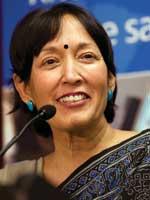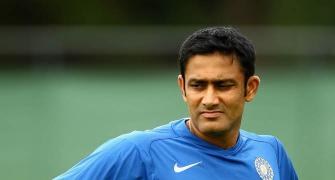 Shashi Tripathi, member of India's Union Public Service Commission -- which administers the Indian civil service exams, among other things -- and former Indian high commissioner to Canada, was invited by the Ottawa-based International Development Research Center June 18 to deliver a speech on 'Young India -- the Growing Youthfulness of an Ancient Civilization'. It was part of its India Lectures organised to mark the 25th year of IDRC's office in India.
Shashi Tripathi, member of India's Union Public Service Commission -- which administers the Indian civil service exams, among other things -- and former Indian high commissioner to Canada, was invited by the Ottawa-based International Development Research Center June 18 to deliver a speech on 'Young India -- the Growing Youthfulness of an Ancient Civilization'. It was part of its India Lectures organised to mark the 25th year of IDRC's office in India.
In an interview with India Abroad, Tripathi detailed the political, economic and social ramifications of India's changing demographics.
Tell us about your IDRC speech.
My topic was on young India and the growing shift in India's demographic profile. It comes as a shock to many people outside India that 54 per cent of India's population is in the age group of 13 to 35 years -- 542 million people out of a 1.2 billion population.
What kind of impact does that have on the Indian society?
I will take three sectors on which the impact of this demographic shift has been the maximum: Political, economic, and social. For example, in the political sector, the results of the recent elections have been quite dramatic. The political pundits had prophesised that there would be a hung parliament. But the voters came out with a definitive vote for a stable government and economic development. What has brought about this dramatic vote? I believe it was young India that brought about this change. Out of 543 members of the Lok Sabha [the Lower House of India's parliament], 302 are new faces. And out of these, 71 are under the age of 35. A number of young MPs have been named ministers and ministers of state.
This time around, there was a change people noticed in the way the voters went to vote and the way they perceived candidates. In previous elections, candidates would go to the voters and would say, 'please give us your votes.' Even people of my generation never ever asked them 'what do you actually do, what's your profession?' If you were a candidate from some rural area, people would ask them, 'will you give us a road? Will you give us power? Electricity?'
This time around there was a distinct change and this change was brought about by young voters. I will give you two examples of the types of advertisements we saw this time on the television. I gave these examples during my talk in Ottawa.
One was of a college student who's speaking to his friends. 'Why are you all sleeping?' And they react: 'Sleeping?' He says, 'Yes, if on the day of the election you don't vote, you are sleeping; and don't complain later.'
Voting during this election was 58 per cent, a very high number. Another ad that made a tremendous impact was portrayal of a young boy sitting in a corner store. One candidate comes to him and says, 'I have come to seek your vote.' The boy says, 'What do you do in life?' The man says, 'What, are you interviewing me?' The boy says, 'But you have applied for the job'. The politician asks, 'What job?' The young boy retorts: 'The job of running the country.'
There were non-governmental organisations who did background checks of all the candidates to find out whether there are charges of corruption, fraud, etc, against the candidates. All these things brought about the change in the results of the recent election. It happened because of activism of young voters.
There are dozens of candidates with criminal records who have been elected to the Lok Sabha.
There are laws about this. If there are mere allegations you are not disqualified from being a candidate. If there are proven criminal charges and you have served prison term, then you are disqualified. So, these people who have been elected, there may be allegations against some of them but those charges have not been proven in the court. Even then, people against whom there were allegations, they haven't been included in the cabinet.
What about the economic impact of the recent election?
India has been on a roll. We have tracked 7 to 8 per cent GDP growth. In fact in 2006-2007, it was 9 per cent. It went even up to 9.4 per cent. Even today, in these recessionary times, India is still clocking GDP growth of 5.8 per cent. Europe has negative growth. Even in the United States it is zero growth. India still has 5.8 per cent growth. One of the reasons is the information technology boom, and in this IT boom there have been contributions of young people.
Most of the workers in the IT industry are between 22 to 35 years of age. In other sectors as well, young people have played a major role in growth. Their contributions can never be over-emphasised. The youngsters are getting huge pay packages now, unlike what was happening earlier. They have lot of cash in their pockets now. They are getting more or less the same pay as multinationals would pay in Europe or North America. And in India the same money goes a long way.
What do they do with all this money? Our value system was you save part of your earning and spend a part. That value system is still there but these young people are spending much more. That helps the economy in one way. They are buying more consumer articles. They are going on more holidays. But on the other hand it is also creating conflict with the older generation. It is resulting in the breaking up of the joint family system.
The other aspect of it is job mobility. The jobs don't occur in their own hometowns. They go out in search of jobs anywhere in the country. They are going to Delhi, Mumbai, Chennai, Bangalore, or even Toronto. What is important in this context is that even the Indian parents, parents from rural areas, farmers, send out their children with their blessings. This is a tremendous change. The farmer no longer insists that his child works on the farm. He's saying you want to make your fortune in Delhi, Mumbai, please go anywhere. That's a change. The joint family system is the building block of Indian society.
What bearing do these changed demographics have on your work with the UPSC?
The largest migration from rural to urban areas is happening in India and China. I see it in my work all the time in the UPSC. In the candidates who come to us, an overwhelming majority now comes from the smaller cities of the country and even the semi-urban and rural areas of the country. These candidates come from very modest backgrounds. These young boys and girls have worked very hard. They have studied. They have moved from a village school to elsewhere for their higher education. Their parents have financed them despite their [meager] economic means. And the government has provided the necessary push with the social empowerment scheme, the education scheme, and they have the educational qualifications and the confidence to come to Delhi, to the UPSC and sit for highest civil service exams in the country. They are as good as anybody else. It shows how our young people are not only intelligent but they have aspirations, hopes and determination to succeed.
Have the Indian civil service exams become tougher?
It is a much more broad-based talent in the country now. In 2008, we had 400,000 applications for the civil service exams -- against 700 people that we take each year. During the last two years we had very good candidates because of job security in the government. And now with the economic downturn, the government jobs are becoming even more attractive. Secondly, the government of India has raised the salaries of government officials almost 10-fold to match with the corporate sector.
How are you enjoying your present position vis-a-vis your diplomatic positions earlier?
That was very different, extremely exciting -- what I did for 35 years. I enjoyed every minute of it. It was extremely satisfying. I left at the pinnacle of my foreign service career as secretary (west) in the ministry of external affairs. When I look back I feel very happy and satisfied. This job is different and a highly prized job. It is a highly honored job. Prime Minister Dr Manmohan Singh nominated me for this job. This job is equivalent to the judge of the Supreme Court.








